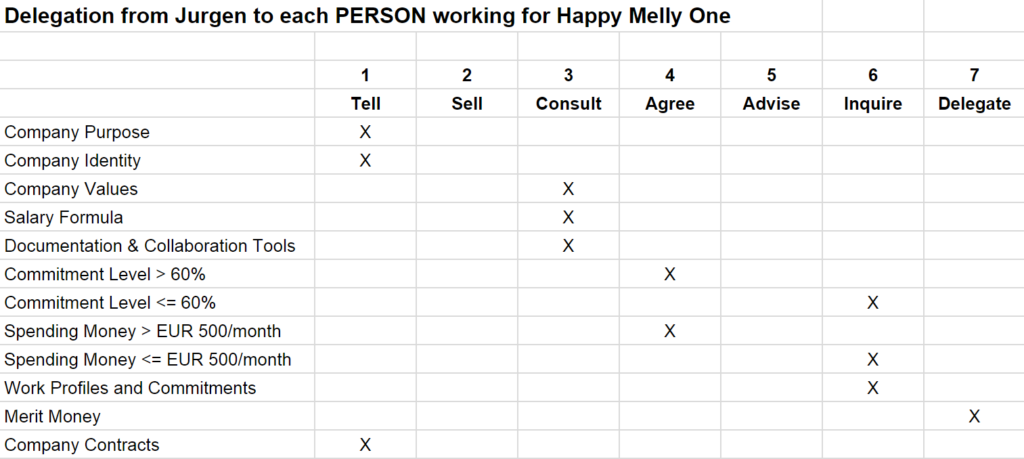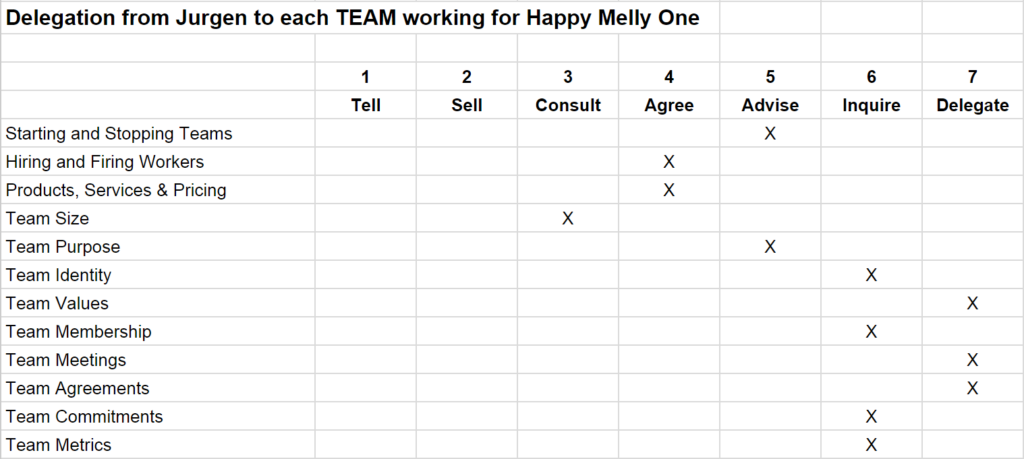by Jurgen Appelo
When you’re a team of just a few people, discussing roles, authorization and delegation is easy. You just show up at a meeting, or on a Slack channel, and ask each other a question:
“Can someone take over email enquiries?”
“Is it OK if I spend some money on Facebook ads?”
“What is the password for our Twitter account?”
“Can I get a copy of each invoice?”
The better your communication, the longer you can postpone documentation. However, there’s a limit to the volume of messages a team can endure. When you’ve heard the question “Can I expense something to the company?” ten times, you know that broadcasting information across all workers doesn’t scale well. With three people, it’s fine. With 30 people, not so much.
That’s why the Management 3.0 team is now preparing for the next phase: we’re scaling up! Our transition will involve multiple small teams, delegation boards, work profiles, team agreements and team metrics. And maybe more! As always, we will implement and experiment with Management 3.0 practices on an as-needed basis.
Let’s start with Delegation Boards


As the owner of a company, you cannot simply delegate everything to a self-organized group of workers. It would be strange, at the least, when someone simply changed the company’s name or purpose, or signed a million-euro contract that would (legally) impact the owner of the business. Clearly, there need to be some boundaries.
In traditional companies, the standard approach is that workers are not allowed to do anything except the tasks that were assigned to them by their managers. At Management 3.0, it’s the opposite. Our team members are allowed to do everything except for some key decision areas described on these delegation boards:
For example, the salary formula of the Management 3.0 workers is my responsibility as the owner, but I simply confirm what the group agrees upon together. They can spend money on expenses in any way they see fit, with a limit of up to 500 Euros per month. If it’s more, then it’s an expense that we should agree together.
They can form teams in any way they like, as long as they keep me updated about any changes. And team size cannot go above 9, or below 3, without my permission. And hiring new people? We’ll do that together so we all agree.
The boards I show you above are my first attempt at clarifying the boundaries for our current Management 3.0 workers. I’m sure the check marks on the boards will move even further from the left to the right, depending on how our self-organizing system will evolve.
It is interesting to note that I tried to make such boards half a year ago, before we started, but I was not able to do so. Apparently, I needed the experience of working with my current team in order to figure out what the relevant key decision areas are, and how to set the appropriate levels of authority.
One thing is certain: at Management 3.0, we start with the idea that all activities are OK unless one of us has come up with a reasonable argument to draw a line somewhere. We cannot play great games, without honoring a few lines and squares. Our challenge is to keep redrawing those lines and squares so that we’re all having fun, while making money and making a difference.
Photo: rawpixel (Unsplash)


Awesome transparency, Jurgen. Thanks for sharing.
With my teams, we’ve got four decision types:
#1. Ones that only leaders can make/take (This type can be made with or without consultation/discussion with the team, consultation is of course preferred.)
#2. Ones that individuals/teams can and should make/take themselves, but need to first check-in with stakeholder/leaders; and in the event of a “tie” or a disagreement on how to proceed, the individual/team calls it. (If the individual/team is not willing to take accountability, then call it a Type 1; sorry, there is no “1.5”)
#3. Ones that individuals / teams can make/take themselves, and inform others (stakeholders, leaders, managers, other teams) after the fact (either “contemporaneously” or “routinely”)
#4. Ones that individuals and teams can make/take themselves. “Just do it.”
Ok, technical there’s a fifth type: “wait to be told what to do… ” ;P
Newly formed teams typically start off heavily skewed with lots of Type 1’s, and few and fewer of the other types as you go down the list.
And as a team matures and becomes more gelled and more performant (Retrospectives help on this path), the balance reverses. More Type 4’s, 3’s, and 2’s and very few 1’s.
More here: http://andycleff.com/2015/04/decision-making-in-high-performance-teams/
Thanks Andy. It seems that your #1 #2 #3 and #4 correspond to my levels 1, 5, 6, and 7. If that works for you, then that’s great. 🙂
I’m curious how you handle a tie / disagreement at Happy Melly w non-type 1 issues…?
The entire purpose of delegation boards is to prevent ties. There might be disagreement, but the level indicates who makes the final call. There are no ties. That’s the point of making these boards.